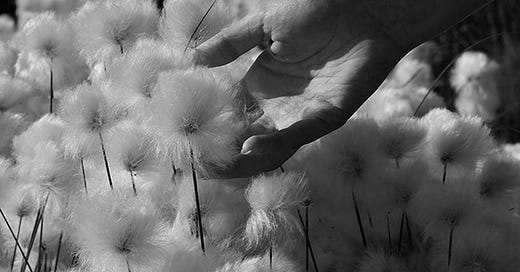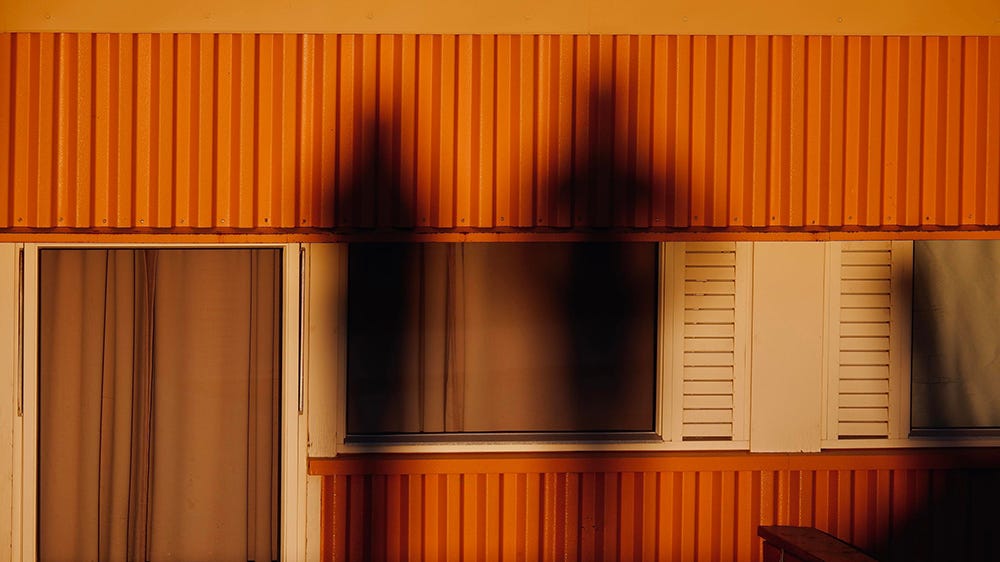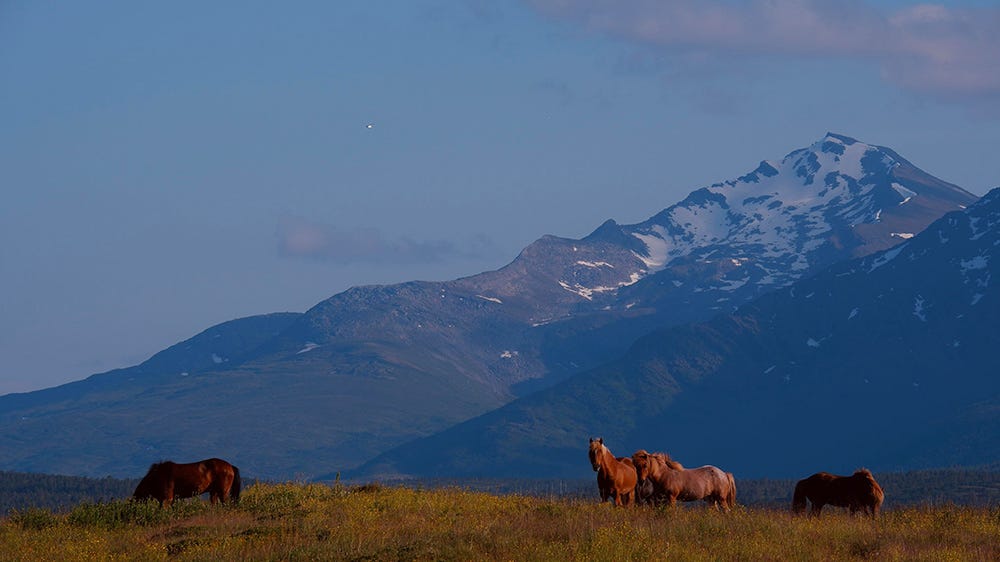Not until this year have I thought of June, or summer more generally, as another month for telling stories. I think of autumn as the season for telling stories. Starting in late fall and into winter, life in the far north returns indoors. We fire up our woodstoves. We return to our favorite books. There are neighbors who we will not see for months after the first snowfall. But this year, on June 1st, we awoke to a landscape covered with fresh snow. There were jokes about this, naturally. There were short videos on Facebook of automatic lawnmowers looking as confused as the rest of us, as they stalled and sputtered through new snow and new grass. We shook our collective heads, and then we said it out loud. June began with snow.
The snow did not last, however. I suppose it could have lasted. Locals have told stories about Junes when the snow did not melt. There are stories, too, of years when the snow hardly melted at all. I did not sense this could be the year for a snowy July. After all, the runoff had been charged. There had been sunny days and too much rain. Nothing melts snow like rain. So it happened just two days later, on June 3rd, the snow vanished. Since then we have been in a summer of near constant sunlight and thawed winds. By the second week of June, full summer had arrived. Now here at the end of June, the property and the hills behind my house are green enough that on an especially sunny day I need to squint my eyes when I first walk outside. Wildflowers have bloomed. The tulips and daffodils in the terraced bed on the north end of the property have thrived. The strawberries I planted with my youngest son have opened new blossoms. The potatoes are lost under a mess of weeds that I’ll need to cull. Yet all is growing. All is wonderfully alive. On the hottest days, we want to stand anywhere outside surrounded by all this green. We lift our hands and spin around, absorbing the blue sea and green mountains across the sund. These are the same mountains that for half the year are snow covered, the same mountains whose upper, jagged walls on the west face look like the domain of winter gods. But now we see the world greening, and we will be filled with necessary sunlight.
For us, there have been evenings spent around the tripod that Tore gave me last year for my birthday. I was not sure what the tripods are called in Norwegian. We build fires in them. I wrote to Tore to ask him. He said they are called bålpanne. Bål is “fire” in Norsk, and panne is “pan.” Makes sense. A fire pan. It is here, on the veranda and around the bålpanne, that we tell our stories again. I admit there could be something overly romantic about this, not necessarily in a false way, but in a way whose idyllic glaze needs defending. It is worth saying that not everything must end in irony, as we have come to expect. As though our boats can no longer be made of wood again. There is beauty in the world. Birds do fly over-head. Sunlight does give us pause. And yes, there are evenings when we sit around a tripod, with a fire rising from the pan like Homeric words, with tin trays at an arm’s reach stacked with skewered meats, ready to be cooked over the fire. This is where our stories might be told again. Stories of food, for instance. It was a couple of years ago that Tore brought over moose steaks from the local grocery store. We cooked them over a fire. The steaks were seasoned with salt, pepper, and a splash of olive oil, and served rare. The warmed olive oil and juices from the steaks basted our fingers as we ate them, perfectly, with our hands. There was another fire, maybe three years ago, when we cooked plain Norwegian camp food—fiskekaker (fishcake), kjøttboller (meatballs) and pølse (sausage)—but that evening, I remember, stretched into a blood orange sunset and brought with it something autumnal. Something of John Denver entered the air. We wanted to call Charlie Pepiton, who, like me, was introduced to John Denver as a boy. Those songs of mountains and sunshine sealed themselves early in our bones. It is true, too, that when Charlie and I get together there invariably comes an occasion—what our spouses refer to as a “John Denver Moment”—when we sing a verse or two from a favorite John tune and tell a story afterwards. Charlie likes to argue how “Leaving on a Jet,” “Goodbye Again,” and “Shanghai Breezes” form a wistful trilogy. I remind Charlie of when Uncle Lloyd died and how I could not sleep and how I listened to John Denver’s Greatest Hits all night long. We have stories of the day John Denver died and about who first told us and about who called to offer condolences. A good feed around a fire, a sunset ushering in some other world—surely this is a John Denver Moment.
We try not to think about summer ending, or I try not to think about it. I caught myself the other day asking how long summer could last. The days have been so nice. We have had so much sunshine this month. I started to count how many days were left in June. As though June will be the only chance for summer this year. Normally I do not count the days nor do I look ahead. But I found myself doing both while sitting shirtless and sun-tired on the veranda. I wondered if I was in a scramble. I wondered if I was acting like Water Rat from The Wind in the Willows. In Chapter 9, “Wayfarers All,” Rat feels restless. He senses change, yet we read that “the light and warmth and colour were still present in undiminished measure, clean of any chilly premonitions of the passing year.” But a change, slight though it seems, has come to the River Bank or at least Rat senses this to be true, though he cannot admit it. When Rat meets a group of field-mice who are “hauling out dusty trunks and dress-baskets, others were already elbow-deep packing their belongings,” he betrays his aggravation. He confronts them:
“What sort of games are you up to?” said the Water Rat severely. “You know it isn’t time to be thinking of winter quarters yet, by a long way!”
“O yes, we know that,” explained a field-mouse rather shamefacedly; “but it’s always as well to be in good time, isn’t it? We really must get all the furniture and baggage and stores moved out of this before those horrid machines begin clicking round the fields; and then, you know, the best flats get picked up so quickly nowadays, and if you’re late you have to put up with anything, and they want such a lot of doing up, too, before they’re fit to move into. Of course, we’re early, we know that; but we’re only just making a start.”
“O, bother starts,” said the Rat. “It’s a splendid day. Come for a row, or a stroll along the hedges, or a picnic in the woods, or something.”
“Well, I think not today; thank you,” replied the field-mouse hurriedly. “Perhaps some other day—when we’ve more time—”
The Rat, with a snort of contempt, swung round to go, tripped over a hatbox, and fell, with undignified remarks.
I wanted to let go of these thoughts about cooler days and autumn. To do this, I went for a walk. And the air was patterned with fragrance. Lilac, meadow sweet, water hemlock, and all the scents of the sea tangled themselves in a continuous breeze along the roadside. I wanted to feel summer. I wanted to feel the sunlight. The world and summer are here today.
While walking, it occurred to me that I have not seen the Arctic terns this year. I maybe saw one tern a couple of weeks ago, but I was too far away to be certain, and we should be certain about our bird sightings. The sea looked bluer than the sky. Sunlight reflected in the windows, and the houses appeared tidy and sleepy. I thought I heard children playing outside, but it was probably seagulls that I heard instead. Seagulls can sound a lot like children playing. Seagulls can also make a sound like someone shouting “hey!” I cannot count the number of times I have turned around to see who is shouting “hey!” only to see a seagull sitting on top of a power pole, shouting at me or some other bird. One neighbor was awake. She was working in her strawberry patch. She wore a black tank top and grey sweatpants. We waved to each other. Between Gunnar’s place and Tron-Gunnar’s property, the birch forest grows back from the road. The field on my left, on the north side, lay studded with yellow wildflowers. This is the field where we watched reindeer this spring, but they are no longer here. They have migrated further to the west. The field to my right, bordered by weeds and wildflowers, is a hay field that extends to the sea. I held out my hand over the edge of the field, over the meadow sweet and lupine, to feel the sunshine growing their leaves.
The sea shimmers under the glare of sunlight. The wind and hard currents make the water choppy. The winds blow harder here, but the morning remains fresh. The Arctic tern colony lives a mile and half from my house, in range of a large, table size stone resting in the sea short meters from the shore. Seagulls like to perch there, as do the terns, though I have never seen them share the stone. I do not wish to say it is a struggle to be here, because being here is not a struggle. Yet it does take an effort to be present and to not let my mind wander towards other memories, other stories, or to exist in some here other than here. Most of us understand where our gifts reside, but much in life can push us towards their diminishing edges, which are our diminishing edges. The birds are somewhere close.
The tern appears as a shadow at first. It is a lean, flying shadow between me and the sea. The shadow is far closer to me than a seagull would fly. It flies in step with my pace, looking out and looking down, before I look up. And when I do look up, I cannot find the bird. The tern has positioned itself between me and the sun. All I see is sunlight and glare. I shield my eyes with my hands. Then I see the Arctic tern, as it flies ahead of me. Sleek and precisely tapered for flight, the Arctic tern is here, in this place where the colony thrives. Suddenly there are two birds. Then there are three! I look around to see if other birds are coming and where they are coming from, but I do not see them until they appear. When they fly beside me, I observe their orange beaks, thin and pointed like a pen, and their heads are half hooded in black masks, like Zorro. Zorros of the North! Who could imagine? They fly with grace, with speed. Any one of them might swoop down and peck me on the head. The Arctic terns have found their way back to where I have seen them before, and they will reside here through August. I watch them. Is this assurance, the fact of Arctic terns returning to the North? This is a question I have. What then is assured?
A half mile further down the road, I come to another naust. Sometimes I touch this naust before I turn around, as though I have crossed a finish line. But today I do not touch naust. I turn around at the other side of the structure and walk towards home again. The sunlight holds fast and bright on the water. A little breeze blows.
Would you like to help create Juke? You can always contribute any amount using these Venmo and Paypal links.
Damon Falke is the author of, among other works, The Scent of a Thousand Rains, Now at the Uncertain Hour, By Way of Passing, and Koppmoll (film). He lives in northern Norway.








Beautiful writing, Damon!
Thanks so much for all you write. You inspire.
"Zorro's of the North! Who could imagine!" <--- These are the kinds of exuberant lines that can stick with me for years. I had the interesting coincidence of reading this work while having had John Denver's "Grandma's Feather Bed" rolling through my head for the past several days.